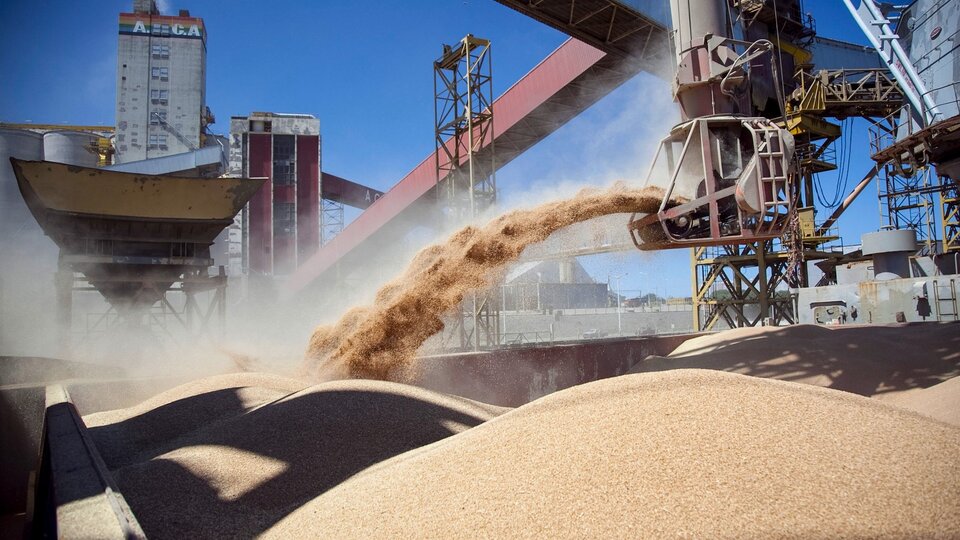Within hours of announcing the new agricultural dollar, which gives companies a better exchange rate to liquidate exports, the Government came out to expose a million-dollar maneuver where grain, fishing and tannery companies kept 4000 million dollars that they did not liquidate before the Central Bank (BCRA). According to the investigation to which he agreed Page I12They did it to take advantage of the exchange gap in two ways: leaving the money abroad or converting it to the value of financial dollars such as Cash with Liquidation.
In this context, to cite an example, a single company did not liquidate 700 million dollars before the BCRA, and the 25 firms that evaded the most did not liquidate for a value greater than 1.5 billion dollars. All this money, for an economy that suffers from a lack of foreign currency, is a lot of money. In order to regularize the situation, the Ministry of the Economy will publish a decree in the next few hours that will give the BCRA the power to take various measures: first, administrative action will be toughened, and the Central Bank may suspend the authorization to operate in the foreign exchange market and carry out new export operations to companies that fail to comply.
Naturally, behind these measures there is a disagreement from the Economy regarding the level of controls that the head of the BCRA is in charge of, Miguel Pesce. As of today, companies must inform their financial agents about the settlement of foreign currency, and the BCRA must control there. This, according to different sources, is not being effective, for which there will also be actions through other State agencies, such as the Customs articulation with AFIP and the Ministry of Agriculture. In parallel, reporting and exchange blocks will be enabled for companies and their partners.
The most mischievous also believe that this information is known just when this Wednesday afternoon, in an act with governors and businessmen in the CCK, Massa will announce the new farm dollar, an exclusive exchange rate for cereal companies and regional economies for 30 and 90 days at a value of 300 pesos. Some point out that the negotiation was hot until these data were put on the table.
Background
According to BCRA communication 7490, the foreign exchange settlement terms for exports of goods range from 15 days from the shipment permit (soy) to 180 days (regional economies), existing cases of 365 days, but always with a maximum 60 days for operations between related companies.
Thus, there have already been several complaints for this type of irregularities. An example is that of the company Diaz & Forti, which denounced but never brought the dollars to the country. Today the case continues in the federal courts of Santa Fe without any news and the owners of Diaz & Forti are waiting abroad for a change in exchange legislation to return to the country without any type of sanction.
In that line, the Customs issued IG 07/2022 (DGA) establishing guidelines to be followed by Customs in those cases in which Exporters do not make the timely entry of foreign currency, establishing that if effective non-compliance were to be verified, the Customs Administrator of registration will order the exporter to that, within a period of 10 days, it proceeds to liquidate the corresponding currencies or to guarantee its income (surety bond).
There were also criminal complaints on the case for the non-settlement of foreign exchange when a simulation of a foreign trade operation is verified. In this sense, the last complaint was, a long time ago, to the Rizobacter firm for the failure to enter the country in foreign currency for US$ 17 million, generated in sales to companies linked abroad.
top 25
To take the dimension of the issue, a reserved report that has already been sent to the BCRA indicates that the 25 main exporting companies have USD 1,543 million pending settlement before the BCRA. All these companies are already being investigated for tax purposes by the DGI-AFIP and presentations have begun before the UIF for possible money laundering.
Even from the chamber of cereal exporters CIARA CEC they have expressed their support for the Government’s measures by saying that “we see positive these actions to stop the operations of ghost companies that operate unfairly in the market causing damage to employment, production, export and currencies in the country”.
Among the 25 largest evaders are Díaz and Forti with 692.5 million dollars; Vicentín with 89.5 million; Alimentos Coronel Baigorria with 79.6 million; Extrugreen SA with 70.9 million. Galileo Technologies with 57.7 million; TBA Group with 51 million; ART Logistics with 45.1; Pesquera Mar Chiquita 39.3 million; Huachana SRL 37.6 million; Trapani SA 37.5; Arlei Tannery with the same amount; Argentine Times SA with 37 million; Expo Impo SRL 28.8; Clodomira Industrial 26.4 million; South American Fat Refinery 24.9; Fisheries Tolmar SA 24.4; Refrigerator HVSA 19.6; International Phoenix 19.5 million; Electro Center 19.4; Global Serv 19 million; Agroskite 18.7; Marfepa 18.6; AMT Sud 18.3 million; Frigorífico General Pico 18.1 million and World Quality Fish 15.9.


